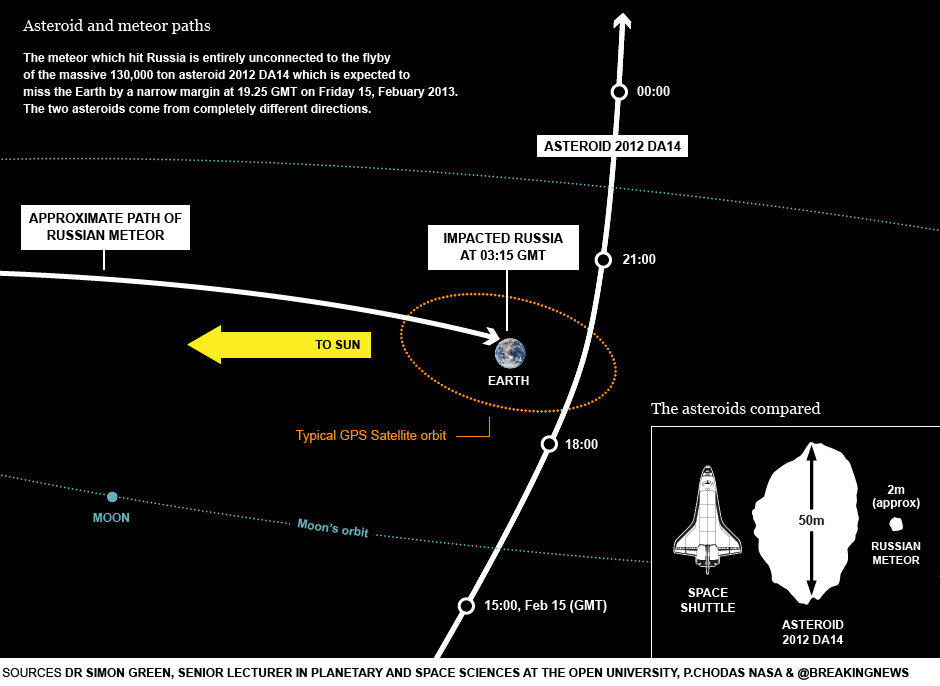- Joined
- 21 April 2009
- Messages
- 13,760
- Reaction score
- 7,702
I call bull on the interception story, but that was definitely a meteor and it probably did explode prior to hitting the ground (as meteors are known to do). Someday, I hope one of these events can be predicted and observed with scientific instruments.Jemiba said:If the claims about an interception are correct, it would be a historical first, I think. Although I cannot think,
that the warhead of a missile would make any difference to the result, would just increase the amount of debris.
flateric said:that's one really IMPRESSIVE - both view and sounds
Archibald said:Let me summarize... 1000 injured, limited but serious damage... and it even touched the ground. And it was only some meters in diameter.
Morale: we are not ready for impact, not yet.


[Update (Feb. 15, 15:45 UTC): The European weather satellite METEOSAT-9 caught images of the meteor trail blowing away due to winds high in the air. An animation was created from the images, displayed below. Note that the trail is oriented northeast to southwest, again very different than the orbit orientation of 2012 DA14 (south to north), indicating this is meteor is unrelated to the previously-known asteroid. Thanks to Timothy Patterson for the tip.]
[Update (Feb. 15, 16:00 UTC): Using the Meteosat-9 images, Paolo Attivissimo overlaid the meteor train on Google maps and finds it's about 320 km (200 miles) long. Wow.]
Bad Astronomy
bobbymike said:So slightly off topic but related tangentially;
If the Russians did not detect this and immediately launch a full scale nuclear response are all those who say a single prompt global strike missile launched from Vandenberg will cause a nuclear conflagration misinformed?
Orionblamblam said:bobbymike said:So slightly off topic but related tangentially;
If the Russians did not detect this and immediately launch a full scale nuclear response are all those who say a single prompt global strike missile launched from Vandenberg will cause a nuclear conflagration misinformed?
If I understand you correctly... no, they're not misinformed. This event looked a *LOT* unlike an ICBM launch. The burst probably looked like a nuke to the satellites, except they would have *instantly* noted no neutrons, Xrays or gamma rays. An ICBM launch would look like an ICBM launch to the satellites because it *is* an ICBM launch.
If nothing else, this event would have been followed with "what the hell just happened," while an unscheduled ICBM launch out of Vandie (or anywhere) would have been followed with "what the hell is going on."
bobbymike said:In my mind if we tell the Russians...
Orionblamblam said:bobbymike said:In my mind if we tell the Russians...
We would also have to have good communications before and during an actual operation. A minute or five of warnign before launch, with indications of the target. Remember, the Russians got all retaliat-ey when a *sounding* rocket went off course; an ICBM would make 'em *real* twitchy.
Think of it this way: a Typoon pops up mid-north-Atlantic and launches a SLBM towards the general direction of, say, D.C. Actual target: a ship full of jihadis carrying a radioactive mutant borscht shoggoth heading towards the US, with the goal of unleashing said apocalypse upon the eastern seaboard with the intent of souring US-Russian relations. A conventionally armed SLBM is the only weapon the Russians have which can take out the ship before it crosses into US waters. Without good communication, how would the US respond?
The meteor that crashed to earth in Russia was about 55 feet in diameter, weighed around 10,000 tons and was made from a stony material, scientists said, making it the largest such object to hit the Earth in more than a century.
Large pieces of it have yet to be found. However, a team from Ural Federal University, which is based in Yekaterinburg, collected 53 fragments, the largest of which was 7 millimeters, according to Viktor Grokhovsky, a scientist at the university.
Data from a global network of sensors indicated that the meteor's fiery disintegration as it neared earth near Chelyabinsk, Russia, unleashed nearly 500 kilotons of energy, more than 30 times the energy of the Hiroshima atomic bomb.
It is the largest reported meteor since the one that hit Tunguska, Siberia, in 1908, according to the National Aeronautics and Space Administration. The U.S. agency's new estimate of the meteor's size was a marked increase from its initial one.
"We would expect an event of this magnitude to occur once every 100 years," said Paul Chodas of NASA's Near-Earth Object Program Office. "When you have a fireball of this size we would expect a large number of meteorites to reach the surface and in this case there were probably some large ones."
You are mistaken. For example:Archibald said:Something puzzling with all those videos is, well, the lack of expletives, of surprise by the Russians
You want to know it? In Russian or in English translation?Archibald said:(how do you say putain de bordel de merde in Russian ?)
